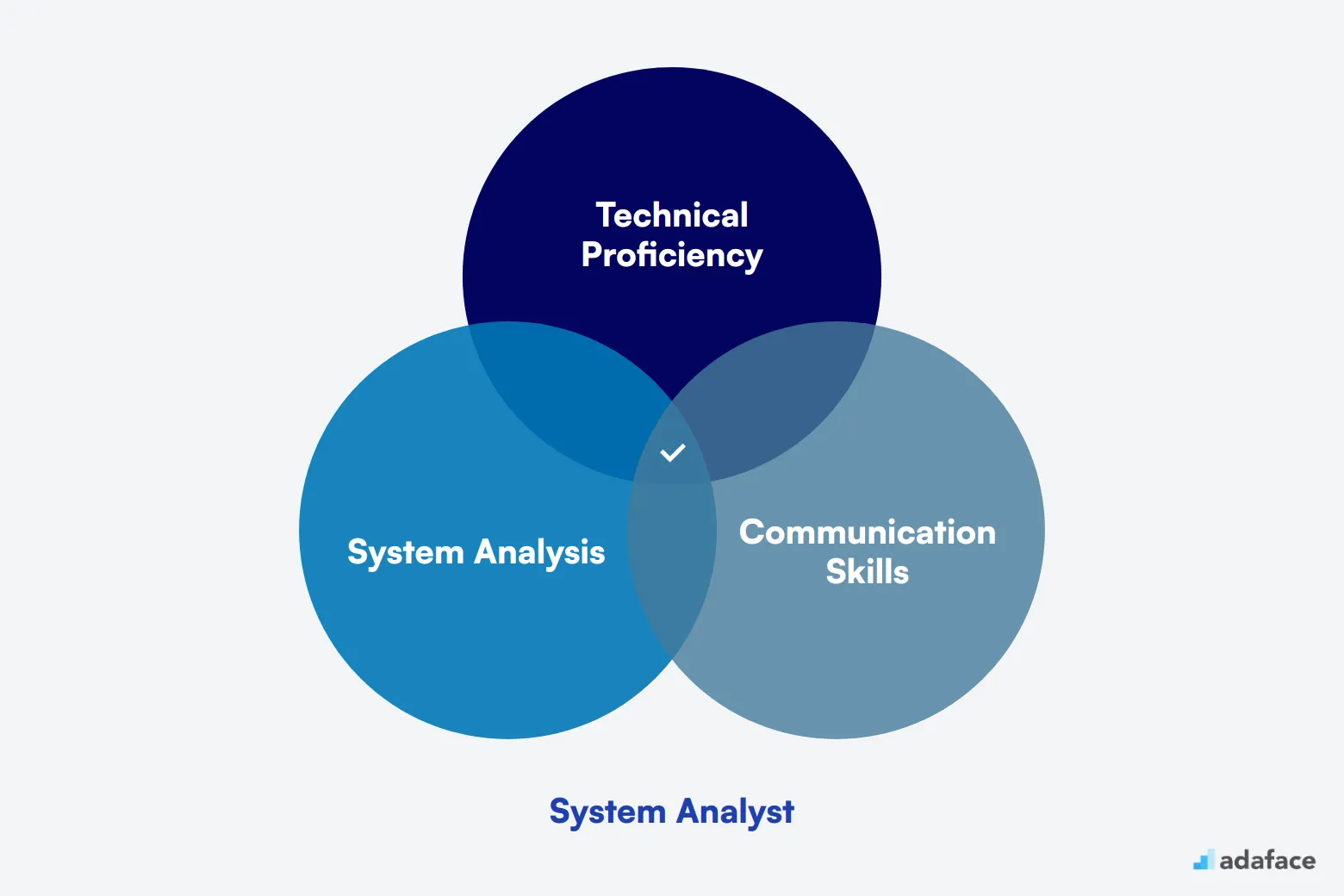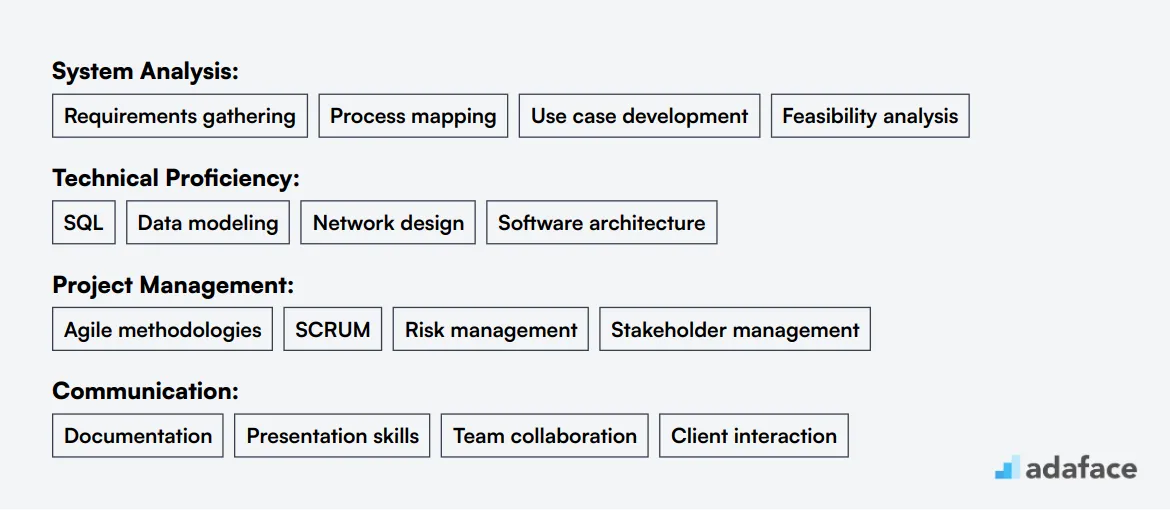System Analysts play a key role in bridging the gap between business needs and technological solutions. However, many companies struggle to find the right fit due to the complex nature of the role. A common pitfall is focusing solely on technical skills while overlooking critical soft skills like communication and problem-solving abilities. It's important to strike a balance between technical expertise and business acumen when hiring for this position.
This guide will walk you through the process of hiring a System Analyst, covering everything from identifying key skills to structuring interviews. We'll provide actionable insights to help you find the ideal candidate who can drive your organization's technological transformation. For a deeper dive into specific skills, check out our comprehensive list of skills required for System Analysts.
Table of contents
Why Hire a System Analyst?
System Analysts are problem solvers who bridge the gap between business needs and IT solutions. They analyze current systems, identify improvements, and design new solutions to boost efficiency and productivity.
Consider hiring a System Analyst when your organization faces challenges like:
- Outdated or inefficient business processes
- Misalignment between IT systems and business goals
- Need for improved data management and reporting
Before committing to a full-time hire, you might want to start with a consultant or conduct a skills assessment to determine the specific expertise required. This approach helps ensure you find the right fit for your organization's unique needs.

Identifying Key Skills and Qualifications for System Analysts
Hiring a System Analyst can be challenging, especially when defining the ideal candidate profile. What one organization considers a must-have skill may simply be a nice-to-have for another. This ambiguity can lead to confusion in the hiring process, making it essential to clearly distinguish between required and preferred qualifications.
A solid candidate for a System Analyst position should have a blend of technical, analytical, and interpersonal skills. To help you streamline your hiring process, we have outlined the essential skills and qualifications to look for, ensuring you attract the right talent for your organization.
| Required skills and qualifications | Preferred skills and qualifications |
|---|---|
| Bachelor's degree in Computer Science, Information Systems, or related field | Master's degree in a related field |
| Minimum of 3 years experience as a System Analyst or similar role | Experience with cloud computing platforms like AWS or Azure |
| Strong understanding of system architecture and software development processes | Familiarity with Agile and Scrum methodologies |
| Proficiency in data modeling and database design | Knowledge of programming languages such as Java, C#, or Python |
| Excellent communication and interpersonal skills | Experience with enterprise resource planning systems |
How to write a System Analyst job description?
Writing a compelling job description for a System Analyst is a key step in attracting the right talent. Once you have a candidate profile ready, the next step is to capture that information effectively in the JD.
• Highlight key responsibilities and impact: Outline the specific duties of the System Analyst, including analyzing system requirements, recommending solutions, and collaborating with stakeholders. Make it clear how these responsibilities contribute to the overall goals of the organization.
• Balance technical skills with soft skills: While it's important to specify technical proficiencies such as experience with SQL or system design, don't forget to emphasize soft skills like analytical thinking and communication. This balance will help attract candidates who can not only solve problems but also work well with others.
• Showcase unique selling points: Mention what sets your company apart—be it innovative projects, a supportive team culture, or growth opportunities. This will draw in candidates who are looking for more than just a paycheck and want to be part of something special.
For a detailed example, refer to the System Analyst job description template that can guide you in drafting your own.
Top Platforms to Hire System Analysts
Now that you have a clear job description for a System Analyst, it's time to list the position on various job sites to attract the right talent. Utilizing popular job platforms can significantly broaden your reach and help you connect with potential candidates who possess the necessary skills.
A widely used platform for professional networking, ideal for listing full-time positions due to its extensive user base and professional focus.

Indeed
Suitable for listing various types of positions as it aggregates listings from multiple sources and reaches a wide audience.

Monster
A well-established job board ideal for full-time roles, providing a large pool of candidates.

Here are three top platforms to consider: LinkedIn is ideal for full-time roles with its extensive professional network. Indeed aggregates job listings, making it suitable for all types of positions. Lastly, Dice is specifically tailored for tech roles, making it a great option for hiring System Analysts.
In addition to these, platforms like Monster and Glassdoor cater well to full-time positions while providing insights into company culture. For those looking for remote or freelance talent, sites like Upwork and FlexJobs could yield promising candidates.
How to screen System Analyst resumes?
Resume screening is a smart way to manage the deluge of applications for the System Analyst role and spot potential candidates before diving into interviews. By quickly sorting through resumes, recruiters can save time and focus on applicants who already tick the right boxes.

When screening manually, it's helpful to know the right keywords. Look for terms like 'System Analysis', 'Technical Proficiency', and 'Communication Skills'. Make sure the resume showcases key skills such as SQL, data modeling, and requirements gathering. This approach helps you zero in on applicants who are more likely to meet your criteria.
For a tech-savvy option, consider using AI-based tools to screen resumes. These tools can assist you by highlighting resumes with matching keywords and providing a filter for candidates. You provide the AI with your desired keywords and it can quickly assess the resumes for you.
Here's a sample prompt you can use:
TASK: Screen resumes to match job description for System Analyst role
INPUT: Resumes
OUTPUT: For each resume, provide following information:
- Email id
- Name
- Matching keywords
- Score (out of 10 based on keywords matched)
- Recommendation (detailed recommendation of whether to shortlist this candidate or not)
- Shortlist (Yes, No or Maybe)
RULES:
- If unsure, put as Maybe instead of No
- Keep recommendation crisp and to the point.
KEYWORDS DATA:
- System Analysis (Requirements gathering, Process mapping, Use case development)
- Technical Proficiency (SQL, Data modeling, Software architecture)
- Communication Skills (Documentation, Team collaboration)
You can explore more on screening candidates and system analyst interview questions to enhance your recruitment process.
Recommended skills tests to screen System Analysts
Skills tests are a highly reliable method to ensure that candidates for a System Analyst role possess the necessary technical and analytical abilities. By using targeted assessments, recruiters can efficiently filter out candidates who meet the requirements of their organization.
Data Modeling Test: This test is indispensable for assessing a candidate's ability to create and manage data models. System Analysts need to understand data structures to design effective systems, making this Data Modeling Test incredibly relevant.
Software System Design Online Test: Understanding system design is central to a System Analyst's role. The Software System Design Online Test evaluates whether candidates can design systems that meet business needs.
UML Online Test: Familiarity with UML diagrams is a common requirement for System Analysts. The UML Online Test checks applicants' proficiency in interpreting and creating UML diagrams, which is crucial for effective communication and documentation.
Business Analyst IT Test: Often, System Analysts need to overlap with Business Analysts in understanding business requirements. The Business Analyst IT Test is a great way to gauge a candidate's ability to translate business needs into technical solutions.
SQL Online Test: SQL skills are often necessary for System Analysts who work with databases. The SQL Online Test ensures your candidate can handle database queries and data manipulation tasks efficiently.
Case Study Assignments to Evaluate System Analysts
Case study assignments can be valuable for assessing System Analysts, but they come with drawbacks. They're time-consuming, may lead to lower candidate participation, and risk losing qualified applicants. However, when used strategically, they can provide insights into a candidate's problem-solving skills and approach to real-world scenarios.
Business Process Optimization: This case study presents a fictional company struggling with inefficient workflows. Candidates are asked to analyze the current processes, identify bottlenecks, and propose solutions to streamline operations. This assignment tests the analyst's ability to map business processes and recommend improvements.
IT System Integration: Candidates are given a scenario where two companies are merging, and their IT systems need integration. The task involves creating a plan to combine databases, software applications, and network infrastructure. This case study evaluates the analyst's technical knowledge and project planning skills.
User Requirements Gathering: This assignment focuses on a new software development project. Candidates must outline their approach to collecting and documenting user requirements, including stakeholder interviews and creating user stories. It assesses the analyst's communication skills and ability to translate business needs into technical specifications.
How to structure interviews for hiring System Analysts
Once candidates have successfully passed the skills tests, the next step is to bring them in for technical interviews that assess their hard skills. While skills tests are efficient in weeding out unfit candidates, they do not necessarily help identify the best fit for the role. Therefore, conducting a technical interview is crucial to better understand a candidate’s capabilities and problem-solving approach.
Here are some sample interview questions tailored for system analyst candidates: 1. Can you describe a complex system you've worked on and your role in it? This question helps assess their experience level and problem-solving abilities. 2. How do you prioritize tasks when faced with multiple pressing issues? It evaluates their time management skills. 3. Explain a time when you had to gather requirements for a project. What was your approach? This checks their communication skills and attention to detail. 4. Describe how you would approach a situation where a system suddenly fails. This question gauges their crisis management skills. 5. How familiar are you with current skills required for system analyst tools and technologies? An essential question to assess their knowledge of the latest industry trends.
What's the difference between a Business Systems Analyst and a Technical Systems Analyst?
Many people confuse Business Systems Analysts and Technical Systems Analysts because both roles involve analyzing systems to improve business operations. However, they have distinctly different focuses and skill sets.
A Business Systems Analyst primarily focuses on understanding and improving business processes and requirements. They possess strong business acumen and are skilled in process mapping. Their work often involves interacting with business users to gather requirements and create documents like business requirements documents and process flows. Business Systems Analysts typically use tools such as BPMN and UML to aid in their analysis.
On the other hand, a Technical Systems Analyst concentrates on technical specifications and system architecture. They are more aligned with the IT side, working closely with IT teams and developers. Their deliverables include technical specifications and system diagrams, utilizing tools like SQL and CASE tools. A background in Computer Science or Information Technology supports their technology-driven problem-solving approach.
Both roles are crucial in project phases. Business Systems Analysts are involved in requirements gathering and user acceptance testing, whereas Technical Systems Analysts contribute during system design and development support. For more insights on the skills required for these roles, explore the skills required for system analyst.
| Business Systems Analyst | Technical Systems Analyst | |
|---|---|---|
| Focus | Business processes and requirements | Technical specifications and system architecture |
| Primary Skills | Business acumen, process mapping | Programming, database design |
| Stakeholder Interaction | Mostly business users | IT teams and developers |
| Deliverables | Business requirements documents, process flows | Technical specifications, system diagrams |
| Tools | BPMN, UML, requirement management tools | SQL, CASE tools, modeling software |
| Background | Business, Management, or related field | Computer Science or Information Technology |
| Problem-Solving Approach | Business-oriented solutions | Technology-driven solutions |
| Project Phase Involvement | Requirements gathering, user acceptance testing | System design, development support |
What are the ranks of System Analysts?
The role of a System Analyst is often confused with other technical positions, leading to ambiguity in the hierarchy. Understanding the different ranks helps clarify responsibilities and expectations within an organization.
• Junior System Analyst: This is typically an entry-level role where individuals assist in gathering and analyzing data. They support senior analysts and are involved in basic troubleshooting and documentation tasks.
• System Analyst: At this level, analysts take on more responsibility in assessing systems and processes. They interact with stakeholders to gather requirements and develop solutions that align with business goals.
• Senior System Analyst: Senior analysts lead projects and mentor junior staff. Their role includes complex problem-solving and higher-level decision-making, often liaising between technical teams and management.
• Lead System Analyst: This position involves overseeing multiple projects and ensuring that analysis meets quality standards. Lead analysts also strategize on technology implementations and serve as the bridge between the IT department and business units.
• Systems Architect: The highest rank in this path, systems architects design overarching frameworks for IT systems. They ensure the technical architecture aligns with business strategies and future growth, often being involved in high-level decision-making.
Hire the Best System Analysts
We've covered the key aspects of hiring System Analysts, from understanding their role to crafting job descriptions, screening resumes, and conducting interviews. We've also explored the differences between Business and Technical System Analysts and discussed their career progression.
The most important takeaway is to use well-crafted job descriptions and skills tests to make your hiring process accurate and effective. By focusing on these elements, you'll be better equipped to find the right System Analyst who can drive your organization's success.
Business Analyst Aptitude Online Test
FAQs
Key skills for a System Analyst include analytical thinking, problem-solving, communication, technical knowledge of systems and software, business process understanding, and project management abilities. You can assess these skills using our System Administration Online Test.
An effective System Analyst job description should outline the role's responsibilities, required technical skills, desired soft skills, and any specific industry experience. It should also highlight the impact of the role on the organization. For a template, check our System Analyst Job Description guide.
LinkedIn, Indeed, and specialized tech job boards are great places to start. You can also consider attending tech conferences or networking events. Don't forget to leverage your company's careers page and employee referral programs.
Look for a combination of technical skills, relevant experience, and educational background. Pay attention to projects they've worked on and any measurable impacts they've made in previous roles. Our Skill Mapping tool can help you identify key skills in resumes.
Ask a mix of technical, situational, and behavioral questions. Include scenarios that test their problem-solving skills and ability to explain complex concepts. For inspiration, check out our System Analyst Interview Questions.
Use a combination of coding tests, system design questions, and case studies. Our Software System Design Online Test can help evaluate their technical proficiency objectively.
While both roles involve analyzing systems, a Business Systems Analyst focuses more on aligning technology with business processes, while a Technical Systems Analyst delves deeper into the technical aspects of system implementation. Tailor your hiring process to emphasize business acumen for the former and technical depth for the latter.

40 min skill tests.
No trick questions.
Accurate shortlisting.
We make it easy for you to find the best candidates in your pipeline with a 40 min skills test.
Try for freeRelated posts
Free resources



